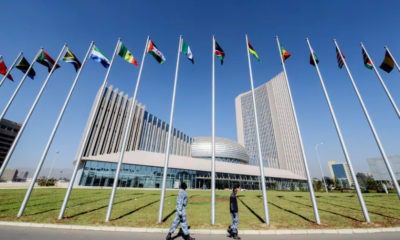Breaking News
UPDATE: Vaccines underpin global health security, prevents over 30 infectious diseases – PFIZER
Every year during World Immunisation Week, Pfizer takes the time to celebrate the impact of vaccines, and this year is no exception even in the midst of heightened concern and apprehension around the status of vaccination programs around the world.

As Nigeria joined the rest of the world to mark this year’s World Immunisation Week, Medical Director, Sub-Saharan Africa, Pfizer, Kodjo Soroh, has explained the importance of vaccines and its innovations for today and in the future.
According to Soroh, vaccines underpin global health security by preventing and controlling over 30 infectious diseases, reducing unnecessary hospitalisations and controlling infectious disease outbreaks.
Each April, the world marks Immunisation week by bringing together people from around the world to highlight the importance of vaccines and how they protect people of all ages against many diseases,.
Speaking on this year’s Immunisation Week, Kodjo Soroh, Medical Director, Sub-Saharan Africa, Pfizer, who noted that at Pfizer, they have a long history in vaccine research and development, including a pivotal role in the eradication of polio and smallpox added that through the development of innovative delivery systems and technologies they have created innovations for preventing deadly bacterial infections.
According to Soroh, apart from preventing and controlling over 30 infectious diseases, vaccines also reduce unnecessary hospitalisations and control infectious disease outbreaks.
“We should not forget that they are one of the world’s most powerful and cost-effective public health tools available and have successfully helped to eradicate, eliminate, and manage many deadly infectious diseases. Smallpox has been eradicated and polio is nearly gone. Cervical cancer could become the first cancer to be eliminated.
“Vaccines also play a critical role in combatting antimicrobial resistance: they can reduce antibiotic use by preventing bacterial infections in the first place, such as with the pneumococcal and meningococcal vaccines, and can also prevent viral infections such as flu, which can provoke secondary infections requiring antibiotics.
“Today, more than at any time in history, people are benefiting from safe and effective vaccines to prevent infections and diseases. These injections have protected people of all ages, from newborns to seniors.
“However, our work is not done. Many viruses and bacteria still present a serious health risk, and so we continue to focus on research and development in new areas, with the goal of adding more approved vaccines to tackle pathogens.
“By getting vaccinated, you can protect yourself and also avoid spreading preventable diseases to other people in your community. Some people cannot get certain vaccines because they are too young or too old or they have a weakened immune system or other serious health condition. Those people are less likely to catch a preventable disease when you and others around them are vaccinated against it. Help protect yourself and the people you love by staying up to date on recommended vaccinations.”
Soroh maintained that though global vaccination coverage figures were looking up they still mask huge inequalities that the world cannot afford to ignore.
“To help protect as many people as possible from life-threatening illness, we’re working to develop and distribute vaccines throughout the world. We’ve already seen that by channeling resources to the most promising public health opportunities, we can have an impact across all areas of life.”
On the week, Soroh stated that this year’s campaign comes at a critical turning point for immunisation. “After over two years of immunisation backsliding caused by COVID-19 pandemic disruptions, we must catch-up, restore and strengthen immunisation services to reach the millions of people missing out on the life-saving benefits of vaccines and stop outbreaks from accelerating.
“In recognition of this historic moment for immunisation, World Immunization Week 2023 will mark the beginning of a year-long campaign with the theme “The Big Catch-up,” representing a global push to vaccinate millions of children and return to pre-pandemic vaccination levels.
Every year during World Immunisation Week, Pfizer takes the time to celebrate the impact of vaccines, and this year is no exception even in the midst of heightened concern and apprehension around the status of vaccination programs around the world.


















